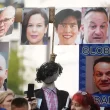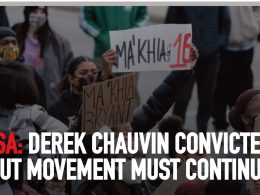By ISA (International Socialist Alternative) reporters
Why is the International Olympic Committee (IOC) so closely allied with China’s dictatorship? This is an issue more and more people are asking in the light of tennis player Peng Shuai’s disappearance since 2 November following her online post accusing top CCP (so-called Communist Party) leader Zhang Gaoli of sexual assault.
The post was erased in less than 30 minutes. Peng has not been able to contact friends or answer calls from concerned groups like the Women’s Tennis Association. On 21 November, the IOC president Thomas Bach announced that he had spoken to Peng in a video interview and that she was “fine”. Neither the video nor a transcript has been published by the IOC. Bach’s interview has drawn widespread condemnation for being staged in collaboration with the Chinese regime for the purposes of defusing a growing international crisis of legitimacy surrounding the Beijing Winter Olympics which open on 4 February.
The IOC has a history of collaboration with right-wing, racist and authoritarian regimes from Hitler’s Germany in the 1930s to military-ruled South Korea in the 1980s. This is also the case in China today, where trade unions and strikes are banned, and the working class is denied the right to organize through vicious repression. The Chinese regime’s police crackdowns in Xinjiang and Hong Kong have drawn global attention to its role, but these examples are not exceptional. As ISA’s China website warned, Xinjiang is a training ground for repressive techniques that are increasingly used all over China.
Behind its mantra “keep politics out of sport” the secretive, undemocratic, and infamously corrupt IOC has followed a distinctly political agenda to deliver super-profits for its capitalist sponsors and ride roughshod over democratic and human rights concerns.
This is the background to the current global debate about an Olympic boycott in February. This issue is raised by different and contradictory forces. There are calls from human rights groups and activists involved in protesting the repression against Uyghur Muslims in Xinjiang and the destruction of democratic rights in Hong Kong. Then there are capitalist governments like the Biden administration whose motives for a boycott are not at all connected to upholding democratic rights, but rather serve its imperialist interests to build a global coalition against Chinese capitalism, to prevent it from challenging or unseating US power.
A “diplomatic boycott”
Biden and several US allies have now launched the idea of a “diplomatic boycott” of the Beijing Games. Most observers are left rubbing their eyes at this. What is the point of this non-boycott boycott? As even a Chinese foreign ministry spokesperson commented, “nobody cares if your diplomats come”. With such an empty gesture, why not a musical boycott (no singing) or a humor boycott (no jokes)?
At the time of writing, those countries which belong to the “Five eyes” Intelligence Alliance of the US, UK, Australia, Canada, and New Zealand have announced they will join the “diplomatic boycott”. The aim of this extremely limited gesture is for the governments concerned to claim they are making a stand, while not jeopardizing the huge profits that the games will generate for their own multinational companies and media organisations. They have also chosen this strategy to avoid a public relations blowback and the risk that an actual boycott campaign could flop by not attracting significant international support at government level.
Given the increasingly clear evidence of horrific repression against the local majority Muslim population in Xinjiang, the assault on trade unions, opposition parties and freedom of assembly in Hong Kong, many will sympathise with the calls for a boycott — not the mealy-mouthed call for a “diplomatic” boycott, but for a total withdrawal of support for the Games.
According to an opinion poll in the Toronto Star, 56% of Canadians support a full boycott. This is clearly impacted by China’s imprisonment of Canadian citizens Michael Spavor and Michael Kovrig for almost three years in retaliation for the detention — house arrest in her own Vancouver mansion — of Huawei heiress Meng Wanzhou. All were released in September. The Canadian poll reveals widespread dissatisfaction with the Biden-led “diplomatic boycott” as an empty and inadequate gesture. A US poll by Morning Consult showed that 24% favour a total boycott, 31% a diplomatic boycott and only 12% oppose a boycott.
This issue reflects contradictory currents. Western capitalist governments are exploiting the issue, while wary of the economic losses from a real boycott, to embellish their “democratic” credentials and further their Cold War agenda of pressuring Beijing. But there are also many ordinary people and especially those victims of CCP repression who support a boycott for genuine reasons believing this can exert pressure on the Chinese regime to change its repressive ways. Unfortunately, that view underestimates what type of pressure and struggle is needed — one of building solidarity with Chinese workers to assist them in organizing to fight for their rights.
It is no coincidence either that the first governments to commit to a diplomatic boycott are from the “Five Eyes”. Three of these countries, the US, UK and Australia recently formed the AUKUS alliance, to provide military capacity to the “Five Eyes” intelligence alliance. Although the Japanese government is currently considering whether to support the diplomatic boycott, other governments, particularly France’s, are opposed. This reflects the tensions and differing priorities of major Western powers — the French government is still licking its wounds over AUKUS which cost Paris a $66 billion submarine contract. If we look closer, we see that for all these governments “democracy” and the “Xinjiang issue” are just a screen for naked financial and great power interests.
None of the governments committed to the so-called boycott are themselves innocent of the repression of minorities and military intervention in other countries — the historic crimes against the indigenous population in Canada and Australia, the treatment of refugees in UK and Australia, racist policing in US as well as the wars launched by Western imperialism in Iraq, Syria and elsewhere, mean these governments are serial human rights violators. Any genuine campaign against the Chinese state’s repression needs to quarantine itself completely from these governments and their hypocrisy.
International Olympic Committee opposes a boycott
Not surprisingly the head of the IOC Thomas Bach opposes any boycott. At a meeting of the IOC Executive Committee he argued: “If we would start to take political sides one way or the other we would never get all the 206 national Olympic committees to the Olympic Games… This would be the politicization of the Olympic Games and this, I would think it further, could be the end of the Olympic Games as it was for the ancient Olympic Games.”
Without going into Bach’s claim about the politicization of the ancient games, which recent research has shown probably ended because they simply became too expensive to run, the whole history of the modern Olympics has been one of politicization, moreover in support of right-wing and authoritarian regimes and big business interests at the expense of working people.
This is underlined by the politics of the IOC Presidents, which include Baron de Coubertin (1896–1925) who opposed womens’ sports as “Impractical, uninteresting, unaesthetic, and we are not afraid to add: incorrect”; Count de Baillet-Latour (1925–1942) who stood between Adolf Hitler and Rudolf Hess when opening the 1936 games; the anti — semitic Swedish industrialist Sigfrid Edström (1942–52) who wrote that “in the USA the day may come when you will have to stop the Jews”; Avery Brundage (1952–72) an anti-Semite who admired Hitler’s Germany, and although he thought “Communism was an evil before which all other evils were insignificant” admired Stalin’s authoritarianism; and, of course, Juan Samaranch (1980–2001) the Spanish Falange (fascist) member who held many top jobs in Franco’s government. Bach was preceded by another aristocrat — Jacques Count Rogge (2001–2013) who presided over a secret deal with the Chinese government to allow censorship of press reports.
Given the right-wing, misogynist tradition of his predecessors it is not surprising that the current IOC President Thomas Bach appears to be complicit in helping the CCP cover up the allegations against his friend Zhang Gaoli, who Peng Shuai has accused of sexual assault. After he took part in the now notorious “proof of life” video, the athletes advocacy group “Global athlete” accused the IOC of having “an abhorrent indifference to sexual violence and the well-being of female athletes”.
When the IOC talks about the games not being “politicized”, they do not object to the games being used by right-wing and authoritarian regimes to bolster their authority.
Starting with the notorious 1936 Berlin games, the 1968 games in Mexico followed just days after a massacre of left-wing students by the Mexican army. One of the students’ chants was “¡No queremos olimpiadas, queremos revolución!” (We don’t want the Olympics, we want revolution!). Two US athletes, supporters of the Black rights’ movement Tommie Smith and John Carlos were expelled from those games after giving the ‘Black power’ salute.
The military regime in South Korea, which was awarded the 1988 games in 1981, a year after it massacred more than 2,000 pro-democracy protesters in the 1980 ‘Gwangju Uprising’ as a platform to improve its global image.
Of course, the 1980 Moscow games following the Soviet invasion of Afghanistan, despite the boycott, was used by the Stalinist bureaucracy to bolster its support at home. That the US-led boycott campaign in 1980 was not really about protecting the rights of the Afghan people, but rather about projecting US power, is shown clearly by US actions in the four decades since, including this year’s chaotic withdrawal that ushered in the return of the Taliban.
The 2014 Winter Olympics in Sochi helped to strengthen the position of the reactionary and increasingly authoritarian Russian regime. With the regime’s prestige boosted by what were then the most expensive games ever, two days before the closing ceremony, Putin issued the secret order to start the take-over of Crimea.
The Olympics represent the worst aspect of modern sports
The IOC presents the Olympic movement as one in which everyone has an equal chance. But everything is corrupted by money. The majority of athletes came from elite schools — about one third of the athletes in the 2012, 2016 and 2021 UK team for example were from private schools, even though 93% of British children attend state schools. Cutbacks in the provision of public sports facilities and the increasing use of commercial sponsorship is making this situation even worse.
Sites for the games are effectively decided by who offers the largest bribes. Allegations about corruption at the top of the IOC eventually broke into a public scandal after Salt Lake City was chosen for the 2002 Winter games. Despite new rules, there were further allegations after London won the 2012 competition. The criteria used to make the decisions are not related to what is most advantageous for the development of sport, but what business, sponsorship and broadcasting facilities are offered by the winner.
Once venues have been selected, the use of child and slave labour, often with the super exploitation of immigrants has been reported for the construction of the Russian, English, Brazilian, Japanese and Chinese sites.
Governments claim that the games themselves will be of benefit to the respective economies. Experience has shown the opposite — people have been forced out of their homes to make way for stadiums — one estimate says that 1.25 million people were displaced from their homes for the 2008 Beijing games, 720,000 for the 1988 Seoul event. The hangover left after the Athens games, and more recently the Rio Olympics include huge debts, white elephant stadiums, and a dramatic rise in inequality. As one commentator after the Rio games commented, “Inequality was exacerbated in a city that’s already infamous for its inequality.”
Sport sponsorship
The corporations too claim they are exempt from politics! Coca-Cola used exactly that excuse when, despite the US boycott, it sponsored the Moscow games. Today we see the same situation with the official sponsors of the Beijing games.
The sponsors include Alibaba, which according to the New York Times developed and marketed facial recognition and surveillance software configured to detect Uyghur faces and those of other ethnic minorities in China. AirBnB has been accused of cooperating with Chinese state-owned paramilitaries involved in the repression of Uyghurs.
They include Samsung, implicated in the use of child labour, union busting, corruption, prostitution and support for far-right groups. Then there is ATOS, manufacturer of ‘battle management’ systems, surveillance systems. ATOS’ sponsorship of the Paralympics has particularly outraged campaigners for the rights of the disabled as its management of the UK government’s ‘work capability’ program has deprived thousands of disability benefits. Not surprisingly, not one of the corporations sponsoring the Beijing winter games is supporting the boycott call. They will lose too much profit.
Have previous boycotts worked?
The 2008 Beijing games were preceded by a vicious clamp-down in Tibet. Yet the so-called international community failed to support the calls to boycott them despite widespread sympathy for the proposal from ordinary people. President Bush was among the world leaders who guested those Olympics, as were the leaders of Australia, France and Japan, showing how much has changed in global relations. At that time, the Chinese dictatorship was welcomed around the Western world with red carpets while ‘human rights’ was a taboo topic as Western capitalism simply couldn’t sign enough deals with Beijing.
In the decades after the Russian revolution, the Bolsheviks did not participate in the Olympic games — they preferred a cooperative physical culture rather than participate in what was a capitalist and elitist approach to sport. The Soviet Union only began to participate in 1952 after the Stalinist bureaucracy had become fully consolidated — the Olympic games became an arena in which the Cold War was played out. In 1936, an alternative “People’s Olympiad” was planned to take place in Barcelona as a protest against the Nazi Olympics in Berlin. The “People’s Olympiad” never took place because of the outbreak of the Spanish Civil War.
The 1980 boycott of the Moscow Olympics had no effect in forcing the Soviet Union to leave Afghanistan, but it allowed the Soviet bureaucracy to domestically present the games as a major victory, despite the boycott, as it allowed Soviet athletes to win a record number of medals.
With the new period of neoliberalism that opened up in the 1980s, the Olympics too were neo-liberalised — becoming even more commercial and elitist.
Today, when the issue of boycotting the Beijing games is raised, socialists take a sympathetic attitude towards this idea when it is raised by workers and youth around the world who are genuinely looking for ways to protest against China’s state repression. But we also warn against any illusions in the IOC, which should be the first target of any boycott campaign, and we especially warn against illusions in capitalist governments who are exploiting this issue for their own power interests. Likewise, when different activist groups raise this question, we distinguish between genuine independent grassroots campaigns and those that are funded or sponsored by government interests in the new Cold War.
Can boycotts work?
An international boycott of the South African racist apartheid regime was launched in 1959. It involved the boycott of sporting and academic events, with the support of the UN and governments. But big business continued to trade with the country. What changed was when the South African working class heroically rose up and organized — 1.5 million took part in the May Day strike of 1986 — new trade unions sprung up and united into a powerful force, winning solidarity action from workers in other countries. This marked the start of the collapse of the apartheid regime.
More recently when big business in football attempted to create a European “Super league” an uprising by fans crushed the idea within days.What do socialists stand for?
Socialists condemn the Chinese regime’s large-scale repression and support full and immediate democratic rights which can only be won by mass struggle, by the working class and the poor;
- We warn against putting any trust in boycotts organized by capitalist governments and capitalist institutions which are used to deceive the public, either through theatrical but empty posturing (“diplomatic boycott”) or by hiding their real intentions which are increasingly linked to the unfolding US-China Cold War;
- We are opposed to the commercialization of sport and its use to promote right-wing, authoritarian regimes — as we see again with next year’s football World Cup in Qatar. Big business should be kicked out of sport, replaced by a big expansion of publicly owned sports facilities and programs provided for all under the democratic control of the athletes and fans;
- Working-class unity and international solidarity linked to revolutionary democratic and socialist policies are the key to overthrowing dictatorships. Capitalism as a world system is a threat to all our democratic rights and only a workers’ movement that is independent of all capitalist governments and agencies can successfully fight it.












